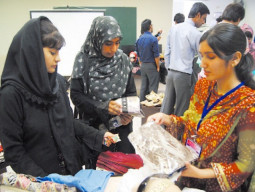
The terrain is amazing as it drains melting glaciers and rainwater from the north to the south, irrigating central plains with the world’s largest and oldest irrigation system, and finally entering the Indian Ocean. The river system comprises Indus, Kabul, Jhelum, Ravi, Chenab and Sutlej. All these rivers and their tributaries are flowing under natural gravity as the country’s geological location and terrain favours a very well-drained gravity system from north to south.
However, Pakistan is currently facing an urban disaster in major cities and Karachi is the worst affected urban centre, hosting the country’s largest population. As the country received heavy showers in the monsoon, the urban drainage system has completely collapsed and water has accumulated in the city centres, damaging houses and infrastructure.
Loss of lives and property is the immediate result of such flooding besides paralysing business, communications, transport and normal life of citizens.
An analysis shows that Pakistan received heavy monsoon showers in the past but till the 1970s heavy floods affected the rural areas close to rivers more than the urban centres because the urban areas were very small and away from the major river system.
Human settlement without any planning has disrupted the natural flow of water through the wonderful watersheds existing in almost all parts of the country.
Sindh govt to develop master plan for 15 districts of province
There are three major reasons for water accumulation to the level of disaster in big cities like Karachi. The most important reason is poor urban planning without any consideration for drainage, second is mushrooming irregular settlements in the absence of any planning all around the expanding cities and third is the lack of disposal of solid waste that accumulates and chokes the drainage system in the cities.
Karachi, with a population of around 20 million, generates over 12,000 tons of solid waste every day besides sewage generation. The collection, recycling and disposal of such a huge quantity of waste is not possible for the civic agencies, which already have a poor capacity.
Consequently, the waste is dumped on roads, natural ravines and streets, which not only pollutes the environment but also becomes a major source of choking the already weak drainage system. Recent heavy rains show the situation on the ground as most parts of this huge city are facing standing water. In 2012, Hyderabad encountered a similar flood-like situation when the city presented the look of a pond for months. The immediate health hazard from the flood was the spread of dengue virus and other diseases throughout the country.
Examples to follow
A review of the regional and international situation shows that Sri Lanka, Thailand and Indonesia, being tropical countries, receive more rainfall during a year but nowhere they face such urban disasters. The reason is strong urban planning and efficient drainage system coupled with sustainable solid waste management.
In Sri Lanka, where I lived for three years until early this year, urban planning is strongly regulated and no one can initiate irregular construction without approval of the urban units concerned.
Solid waste is segregated at source and recycled immediately and nobody will see the solid waste dumped on roads and streets. Similarly, Thailand where I stayed earlier, has divided the entire country into watersheds and no activity other than that prescribed for different watersheds is allowed.
For instance, Bangkok is an urban watershed and is only meant for urban settlement, which means no other activity like industrial and farming is allowed there. Once declared an urban settlement, the watershed planning and development is done using urban planning tools and techniques. Pakistan is facing multiple problems in ensuring sustainable urban planning and management. It seems that urban planning institutions and professionals are neither involved in nor made responsible for the design and planning of urban settlements.
Also, the regulators of urban settlements have failed to control irregular urban sprawl in major cities like Karachi.
To address these problems, the following suggestions are proposed based on the existing situation: review the institutional capacity of urban development institutions including civic agencies and improve their capacity, strengthen urban planning arms of the civic agencies and ensure implementation of relevant laws and policies, ensure each city has a strong solid waste and sewage recycling unit and improve its capacity through local, national and globally available resources.
Urban settlement and new housing societies must also be strictly regulated besides introducing the concept of watershed management, allowing free flow of water through the natural waterways. Community-based urban planning and governance and waste recycling must be encouraged after adequate consultation.
The writer is a PhD in natural resources management and is a civil servant
Published in The Express Tribune, August 14th, 2019.
Like Business on Facebook, follow @TribuneBiz on Twitter to stay informed and join in the conversation.

















COMMENTS
Comments are moderated and generally will be posted if they are on-topic and not abusive.
For more information, please see our Comments FAQ